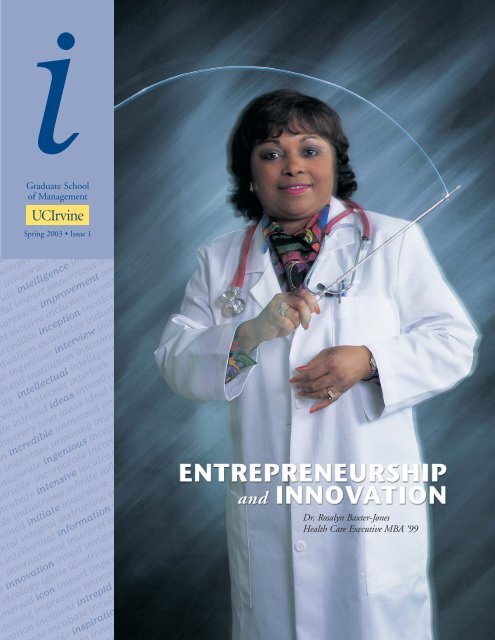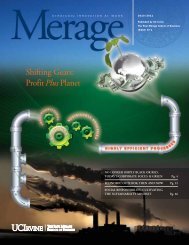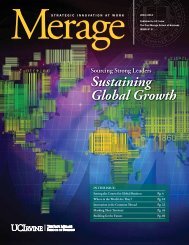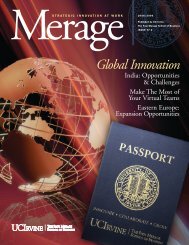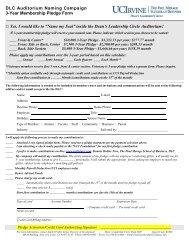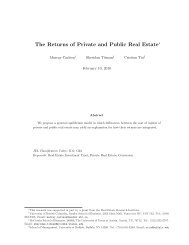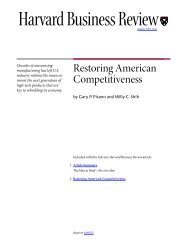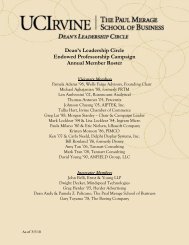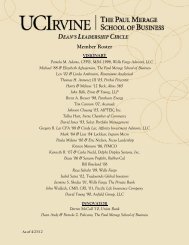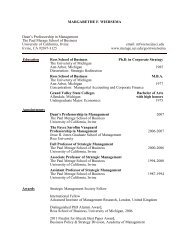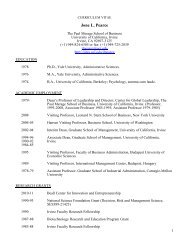i mag spring2003.qxd - The Paul Merage School of Business ...
i mag spring2003.qxd - The Paul Merage School of Business ...
i mag spring2003.qxd - The Paul Merage School of Business ...
You also want an ePaper? Increase the reach of your titles
YUMPU automatically turns print PDFs into web optimized ePapers that Google loves.
Graduate <strong>School</strong><br />
<strong>of</strong> Management<br />
Spring 2003 • Issue 1<br />
inte<br />
nterpret i<br />
invigorate invo<br />
ite intelligence i<strong>mag</strong><br />
ful impart impervious impo<br />
pressive improvement impl<br />
t incisive inclusive incenti<br />
credible inception inculcat<br />
dualism indivisible industri<br />
e ingenious interview initia<br />
instill institution instrumen<br />
ity intellectual intelligence<br />
esting interject interlock in<br />
te intrepid ideas inventive<br />
tinerary icon ideas ideal id<br />
n incredible immersed imp<br />
important imposing impre<br />
augurate ingenious incepti<br />
arable incorporate increas<br />
cubate intensive inculcate<br />
le industrious infinite influ<br />
ained initiate inquisitive in<br />
ntal integral instruction int<br />
intellectual information in<br />
international interpret int<br />
e innovation invest invigora<br />
ideology ignite illustrious i<br />
mersed icon impart imperv<br />
posing impressive improve<br />
ption incipient intrepid in<br />
se incubate inculca<br />
e inspiration<br />
innova<br />
i<br />
Dr. Rosalyn Baxter-Jones<br />
Health Care Executive MBA ‘99
2<br />
4<br />
6<br />
7<br />
8<br />
10<br />
12<br />
13<br />
16<br />
Focus<br />
GSM Launches Center for<br />
Entrepreneurship and Innovation<br />
Students<br />
<strong>The</strong>y Douse Tech Brushfires<br />
Community<br />
All Hands on Deck<br />
for MBA Job Placements<br />
Leadership<br />
A <strong>School</strong>’s Best Capital is Intellectual<br />
Research<br />
Risk and Success in New Ventures<br />
Alumni<br />
3 GSM Entrepreneurs and<br />
<strong>The</strong>ir Start-Up Companies<br />
Alumni Network News<br />
Briefly<br />
Conferences<br />
Kudos<br />
Coming Up<br />
GSM Events<br />
Alumni Network Events<br />
Cover: Dr. Rosalyn Baxter-Jones, Health Care Executive MBA ‘99<br />
Photo by Dwight Vallely<br />
i is published three times a year by the UC Irvine Graduate <strong>School</strong> <strong>of</strong><br />
Management, Communications Office, MPAA Suite 210, Irvine, CA<br />
92697-3130. Contact the editor at (949) 824-6286.<br />
Editor Linda McCrerey<br />
Production Francine Matijak<br />
Writers John Gregory, Imran Husain<br />
Photography Dwight Vallely, Monty Ma, Wilson Kwong<br />
Art Direction Dan LaBelle, LiveWire Media<br />
Printing Lester Lithograph, Inc.<br />
IRVINE FAMILY =<br />
ENTREPRENEURSHIP<br />
Entrepreneurship and Irvine have been<br />
synonymous words since 1849 when<br />
Scot-Irish immigrant James Irvine<br />
opened Irvine and Company, Wholesale<br />
Produce and Grocery Mchts., in San<br />
Francisco to cater to the gold rush business.<br />
Perhaps the sign above his door<br />
was too short to spell out “Merchants.”<br />
As told by Joan Irvine Smith, his great-granddaughter,<br />
James Irvine used the pr<strong>of</strong>its from<br />
his store to create a partnership with three<br />
wealthy sheep ranchers who bought large<br />
parcels <strong>of</strong> real estate. <strong>The</strong>ir largest was the<br />
115,000-acre Rancho San Joaquin that<br />
stretched from the coast to San Bernardino.<br />
<strong>The</strong> UC Irvine campus sits on a portion <strong>of</strong><br />
the old rancho.<br />
In 1868 Irvine built a ranch house on the<br />
property – the first wooden home between<br />
Anaheim and San Diego – that became his<br />
family’s residence while he oversaw the<br />
40,000-sheep operation. Irvine bought out<br />
his partners, added cattle and hogs to the<br />
livestock, created hay and grain operations<br />
and was instrumental in expanding railroad<br />
and steamship operations into what is now<br />
Orange County. When he died in 1886, his<br />
son, James II, learned the trade and later<br />
formed the Irvine Company that became an<br />
agricultural empire.
Dean’s Message<br />
I am pleased to introduce our inaugural issue <strong>of</strong> our new <strong>mag</strong>azine, i.<br />
Together with our e-newsletter launched last summer, we hope to provide<br />
more information to you in a way that is attractive and interesting.<br />
<strong>The</strong> e-newsletter frees us from the cost and sloth <strong>of</strong> paper and lets you<br />
click on those stories that grab your interest. To receive the e-newsletter,<br />
please send your email address to gsmnews@gsm.uci.edu.<br />
This <strong>mag</strong>azine, i, will better present UC Irvine’s Graduate <strong>School</strong> <strong>of</strong><br />
Management to our own community and interested others. Each issue<br />
<strong>of</strong> i will take an in-depth look at one facet <strong>of</strong> our intellectual community,<br />
a format that allows us to better communicate the richness <strong>of</strong> the<br />
extraordinary contributions <strong>of</strong> our students, faculty, alumni and supporters.<br />
GSM is a collection <strong>of</strong> interesting people doing exciting things,<br />
and we hope to give you a better feel for its richness in i.<br />
First, about its name: i is a small word that represents some big features<br />
<strong>of</strong> GSM. Of course, it represents Irvine. It also represents<br />
innovation and ideas, information technology and intellectual capital,<br />
initiative and inspiration; characteristics <strong>of</strong> our education, scholarship<br />
and community. Thanks to Diane Forsman, visiting lecturer and<br />
EMBA ‘97, and Brad Eisenstein, FEMBA ‘05, for submitting versions<br />
<strong>of</strong> i as title suggestions.<br />
This issue focuses on entrepreneurship and innovation. We announce<br />
the launch <strong>of</strong> our new Center for Entrepreneurship and Innovation,<br />
and let you know about some <strong>of</strong> the programs, conferences and courses<br />
we are conducting in the next few months. We also will share a small<br />
sampling <strong>of</strong> the exciting entrepreneurial launches and innovations our<br />
students and alumni have developed, and introduce some <strong>of</strong> the new<br />
knowledge in entrepreneurship and innovation created by our faculty.<br />
We hope you enjoy it,<br />
Dean Jone L. Pearce<br />
1
Focus<br />
Visit CEI on the Web at http://www.gsm.uci.edu/go/cei<br />
GSM Launches<br />
CENTER for<br />
ENTREPRENEURSHIP<br />
and INNOVATION<br />
Some MBA students hope to never work for a large firm, unless it’s their own.<br />
Now they can find, under one umbrella, the school’s rich variety <strong>of</strong> courses, activities and information<br />
to prepare them for starting and managing their own companies. <strong>The</strong> Center for<br />
Entrepreneurship and Innovation (CEI) launched in January. It is a central clearinghouse and<br />
coordinating unit for the school’s myriad <strong>of</strong>ferings for the budding entrepreneur and innovator<br />
– programs, classes, research projects, speakers, activities and clubs related to starting a company<br />
and developing new ideas.<br />
“We are very excited about this new center, which begins as<br />
a place to coordinate current GSM programs and services<br />
in entrepreneurship and innovation, and to better link<br />
GSM and the larger university and business communities,”<br />
said Dean Jone Pearce. “This center will develop new educational<br />
initiatives and community-GSM programs and<br />
help to support faculty and doctoral student research on<br />
entrepreneurship and innovation.”<br />
Shaheen Husain is executive director, in addition to her role<br />
as executive director <strong>of</strong> the Center for Leadership<br />
Development. Pr<strong>of</strong>essor Claudia Bird (Kaye) Schoonhoven is<br />
faculty advisor.<br />
For students, the CEI will manage two major extra-curricular<br />
projects: the ThinkTank/GSM Campus-Wide <strong>Business</strong><br />
Plan Competition and the Irvine Innovation Initiative (I 3 ).<br />
“We provide services to the community, too,” Husain said.<br />
“<strong>The</strong> CEI acts as a clearinghouse for start-up consulting<br />
projects where MBA students can help local entrepreneurs.<br />
We invite the community to our presentations and workshops<br />
and work with GSM’s Executive Education Program<br />
to design custom courses for entrepreneurs and innovators.<br />
“We also help support women entrepreneurs through<br />
the Women’s <strong>Business</strong> Connection that works with the<br />
GSM Women in <strong>Business</strong> Association. We hope to<br />
make it easier to learn about the new work the faculty<br />
are doing by posting research papers on the Web site.”<br />
<strong>The</strong> goal is to develop the CEI into a self-sustaining<br />
business unit at GSM, she added.<br />
Classes in entrepreneurship and new ventures have been in<br />
the GSM curriculum since 1993. Academic <strong>of</strong>ferings in<br />
2002-2003 include Pr<strong>of</strong>essor Schoonhoven’s two classes,<br />
Entrepreneurship and <strong>Business</strong> Planning for New Ventures;<br />
Innovations start with ideas, says Shaheen Husain, executive director<br />
<strong>of</strong> the Center for Entrepreneurship and Innovation.
Pr<strong>of</strong>essor David Robinson’s New Ventures and <strong>Business</strong><br />
Strategy; Pr<strong>of</strong>essor Eli Talmor’s course in Private Equity;<br />
Pr<strong>of</strong>essor Rajeev Tyagi’s New Product Development,<br />
Pr<strong>of</strong>essor Lisa Barron’s Negotiations, and Pr<strong>of</strong>essor David<br />
Obstfeld’s emphasis on entrepreneurship and innovation in<br />
his strategy course.<br />
<strong>The</strong> idea for a central clearinghouse and coordinating unit<br />
for all <strong>of</strong> the school’s <strong>of</strong>ferings in entrepreneurship and<br />
innovation came about inadvertently as Dean Jone Pearce<br />
returned a phone call to a local business reporter asking for<br />
comment on a corporate management story.<br />
“<strong>The</strong> reporter said, ‘I don’t know you because I usually<br />
cover entrepreneurship.’ I thought to myself, if the local<br />
community doesn’t realise that our school is a leader in<br />
entrepreneurship, we need to let them know in a more<br />
visible way,” said Pearce.<br />
One <strong>of</strong> the CEI’s main projects is coordinating the annual<br />
Think Tank/GSM Campus-Wide <strong>Business</strong> Plan<br />
Competition. Alerted by campus-wide emails and ads, more<br />
than 160 undergraduate and graduate students from engineering,<br />
information and computer sciences, medicine life<br />
Shaheen Husain, CEI<br />
Program Manager<br />
Nicole Scarcello and<br />
MBA interns Beau<br />
Schindler, ‘03, and<br />
Erik Edwards, ‘04.<br />
sciences, social sciences, social ecology, management and the<br />
arts teamed up to develop business plans. Executives from<br />
local firms are leading a series <strong>of</strong> workshops to help the<br />
teams hone their plans and presentation skills.<br />
ThinkTank and its founder, Scott Blum, are funding the<br />
competition with a $100,000 gift to the school. <strong>Business</strong><br />
development awards <strong>of</strong> $50,000 will go to the first-place<br />
team and $10,000 to second-place team on May 31.<br />
Another key project, the Irvine Innovation Initiative (I 3 ),<br />
helps students get their businesses going by providing a<br />
24/7 facility in the MPAA building. Thomas Eppel, assistant<br />
dean <strong>of</strong> ITM and I 3 coordinator, is faculty advisor. “I 3<br />
complements other curricular and co-curricular activities at<br />
GSM that support innovation and entrepreneurship,” said<br />
Eppel. “Local business leaders advise MBA teams as they<br />
experiment with innovative business ideas.”<br />
<strong>The</strong> CEI will work with the Entrepreneur Association, a<br />
student organization that invites business leaders to the<br />
school to answer questions and lead workshops. “<strong>The</strong>se<br />
events add value to the education process at GSM,” said<br />
Don Phan, MBA ‘03, club president. –Linda McCrerey<br />
3
Students<br />
MBA students and TechRoom founders Katrina Snyder, front left, and James Coleman, front right, meet with their<br />
staff technicians Jackson Luk, front middle, and in back row, Jason Ng, Rishi Patel, Mike Gleason and Brenda Kuk.
<strong>The</strong>y DouseTECH<br />
BRUSHFIRES<br />
“My building’s on fire!” Those were the first words James<br />
Coleman heard when he picked up the phone in his garageat<br />
that time, the corporate headquarters <strong>of</strong> TechRoom, the<br />
technical service firm he created with business partner and<br />
FEMBA ‘03 classmate Katrina Snyder.<br />
What the client needed while speaking on her cell phone<br />
outside the blazing building was a major rescue mission:<br />
save as much data as possible after the fire department<br />
declared it was safe to enter the structure. “We waded<br />
through water and ash to retrieve data,” recalled Coleman,<br />
CEO <strong>of</strong> TechRoom, “then ordered new equipment and got<br />
their company’s network up and running in a week.”<br />
Just another week in the lives <strong>of</strong> two fully-employed students<br />
who juggle the demands <strong>of</strong> their work, family,<br />
schoolwork and their new enterprise. He and Snyder met<br />
while attending their first GSM course in Fall 2001.<br />
Appropriately, their first class exercise was deciding what to<br />
do when surrounded by a raging fire in the Australian<br />
outback.<br />
Coleman’s vision <strong>of</strong> service excellence became a reality at<br />
GSM. Coleman and Snyder were able to draw upon new<br />
business skills acquired in their classes. Pr<strong>of</strong>essor Claudia Bird<br />
Schoonhoven advised their business planning; Pr<strong>of</strong>essor<br />
Imran Currim aided their marketing strategy; and Pr<strong>of</strong>essor<br />
Rick So helped them push the envelope in service operations.<br />
<strong>The</strong>y launched the company in Coleman’s garage in<br />
November 2001. When summer approached, they bought a<br />
little air conditioner they affectionately call R2D2.<br />
<strong>The</strong>ir goal was to avoid the stigma plaguing the tech industry.<br />
“Technicians aren’t perceived as being friendly service<br />
people,” Coleman explained. “We train ours to be customer<br />
service experts. Each customer is viewed as a partner,<br />
not as a transaction, and we retain that relationship long<br />
after the job is done.”<br />
TechRoom makes house calls and maintains a walk-in<br />
service center in Newport Beach, where the team moved in<br />
November 2002 on their first anniversary as a company.<br />
TechRoom associates provide detailed written reports and<br />
follow up on every service. <strong>The</strong> formula seems to be<br />
working. <strong>The</strong> company has been pr<strong>of</strong>itable every month,<br />
said Snyder, and has grown to eight employees.<br />
“Our personalities are different and that works well in our<br />
business,” Snyder said. “James leads TechRoom with pure<br />
vision and passion.”<br />
“And Katrina is much more than our CFO,” Coleman<br />
chimed in. “She taught me how to balance my life and<br />
business.”<br />
<strong>The</strong> future? “We are becoming what Kinkos and Starbucks<br />
are to their customers,” Coleman said. “You get reliable<br />
service day or night.” –John Gregory<br />
5
Community<br />
All HANDS ON DECK<br />
for MBA JOB PLACEMENTS<br />
When the going gets tough, the tough join forces. That’s<br />
GSM’s strategy for finding jobs for MBA students and<br />
soon-to-be graduates. Although many <strong>of</strong> them aspire to<br />
entrepreneurial futures, right now they need jobs.<br />
Faced with a dismal job market, staff members from<br />
many departments – MBA Admissions, MBA Career<br />
Center, Student Services, Alumni Relations, Center for<br />
Leadership Development, Corporate Partners Program,<br />
Real Estate Program and Executive Education Program –<br />
and community members are combining resources and<br />
coordinating efforts.<br />
<strong>The</strong>ir mission: to encourage employers to hire the school’s<br />
MBAs, who are among the best in the country. In the<br />
process <strong>of</strong> seeking out MBA internships and career positions,<br />
GSM is strengthening its ties with alumni and the<br />
corporate community.<br />
“This is a strategic alliance that benefits our school and the<br />
corporate community,” said Judy Cottrell, assistant dean <strong>of</strong><br />
external relations. “By working together toward the goal <strong>of</strong><br />
job placements, we are creating the synergy that is the<br />
mission <strong>of</strong> the Corporate Partners Program.” Ashwin<br />
Rangan, chair <strong>of</strong> the CPP steering committee and senior vice<br />
president/CIO <strong>of</strong> Conexant, and Chuck Martin, chair <strong>of</strong> the<br />
Dean’s Board <strong>of</strong> Directors and managing partner <strong>of</strong><br />
VentureLab LLC, have been especially active in urging<br />
members <strong>of</strong> their groups to hire GSM students.<br />
In any MBA school, the most important job contacts are<br />
alumni, said Sandra Findly, associate alumni director.<br />
“Alumni have allegiance to the school and will help us.”<br />
GSM staff members are making calls and visits to those<br />
corporations with large numbers <strong>of</strong> alumni, including<br />
Conexant, Disneyland Resort, Fluor, Allergan, Toshiba and<br />
Boeing. <strong>The</strong>se visits pay <strong>of</strong>f on both sides, updating alums<br />
on involvement opportunities with the school, such as the<br />
Mentoring Program and guest speakers.<br />
We hear that they want more continuing education events.<br />
So we explain how their companies can benefit from our<br />
executive degree programs – EMBA, HCEMBA and<br />
FEMBA – and the Executive Education Program,” said<br />
Findly.<br />
Visit us on the Web at http://www.gsm.uci.edu<br />
In a down economy and with stiff placement competition<br />
from other MBA schools, it is imperative that GSM’s<br />
diverse departments mount a collaborative effort, said<br />
MBA Career Center Director Randy Williams.<br />
Career positions are the other part <strong>of</strong> the school’s placement<br />
campaign. Since 1990, about 75 percent <strong>of</strong> the school’s<br />
MBA graduates end up working in Southern California,<br />
and about ten percent in Northern California, so the school<br />
focuses most <strong>of</strong> its placement energy on Orange County,<br />
Los Angeles and San Diego, said Williams.<br />
Besides making personal visits, the school’s staff is<br />
sending postcards and emails and conducting advertising<br />
and marketing campaigns. Every week the MBA Career<br />
Center staff attends networking gatherings to meet<br />
recruiters at economic forecast forums, marketing associations,<br />
employment manager meetings and other events.<br />
<strong>The</strong>y are using the strength <strong>of</strong> the Dean’s Board <strong>of</strong><br />
Directors and Corporate Partners Program to encourage<br />
firms to employ MBA students.<br />
Williams is working with John Clarke, assistant dean and<br />
CIO, to develop a new database and call report system integrated<br />
into the school’s Intranet powered by Catalyst, to<br />
help coordinate and track corporate outreach activities.<br />
GSM students collect job information at MBA Career Fair.
Leadership<br />
A SCHOOL’S BEST<br />
CAPITAL is INTELLECTUAL<br />
When Dean Jone Pearce announced that GSM has risen in<br />
the rankings, Greg Battersby, FEMBA ‘04, responded with:<br />
“No surprise there. Anteaters are terrific climbers.”<br />
And climb GSM has. <strong>Business</strong>Week’s most recent survey<br />
ranks GSM’s faculty as fifth best in intellectual capital,<br />
defined as the number <strong>of</strong> articles pr<strong>of</strong>essors write for the<br />
leading academic publications. That puts GSM faculty<br />
ahead <strong>of</strong> such schools as Harvard, Pennsylvania’s Wharton,<br />
Northwestern, Columbia, UCLA and USC, and trailing<br />
only Stanford, MIT, UC Berkeley and Duke in that order.<br />
It’s not difficult to see why. GSM’s<br />
faculty has been busy at the keyboard<br />
writing articles and producing research<br />
papers. Here’s just a sample <strong>of</strong> recent<br />
publications:<br />
• Margarethe Wiersema’s paper,<br />
“Holes at the Top: Why CEO<br />
Firings Backfire,” appeared in the<br />
December issue <strong>of</strong> Harvard <strong>Business</strong><br />
Review. Boards <strong>of</strong> directors, she<br />
wrote, “<strong>of</strong>ten lack the strategic<br />
understanding <strong>of</strong> the business necessary<br />
to give due diligence to the<br />
CEO selection process.”<br />
• A research paper in Information<br />
Systems Research by Kevin Zhu and<br />
Ken Kraemer concluded that while<br />
e-commerce reduces costs for technology companies,<br />
this Internet-based service actually increases expenses for<br />
traditional manufacturing companies.<br />
• Marta Elvira co-authored a paper, published in<br />
Organization Science, which confirms that in certain<br />
jobs, the more women there are, the lower the pay <strong>of</strong><br />
everyone in that job.<br />
...GSM is one <strong>of</strong> only<br />
11 schools in the<br />
world in which all<br />
faculty members hold<br />
doctorate degrees.<br />
– <strong>The</strong> Financial Times rankings<br />
• Charles Shi, writing in Journal <strong>of</strong> Accounting &<br />
Economics, concluded from his studies on the value <strong>of</strong><br />
corporate R&D that the risks outweigh the benefits<br />
for creditors.<br />
• Connie Pechmann, in the Journal <strong>of</strong> Consumer<br />
Research, described the influences <strong>of</strong> both advertising<br />
and peer-pressure on smoking among young high<br />
school students.<br />
• GSM’s pr<strong>of</strong>essors are the editors <strong>of</strong> the leading scholarly<br />
journals in their fields. For example, Claudia Bird<br />
Schoonhoven is editor-in-chief <strong>of</strong><br />
Organization Science. Philippe Jorion<br />
edits Journal <strong>of</strong> Risk.<br />
<strong>The</strong> Financial Times rankings also<br />
showcases GSM’s faculty intellectual<br />
capital, reporting that GSM is one <strong>of</strong><br />
only 11 schools in the world (ranked<br />
by the publication) in which all faculty<br />
members hold doctorate degrees.<br />
<strong>The</strong>re are many other indicators <strong>of</strong><br />
GSM’s strength in the rankings.<br />
According to the Financial Times, GSM<br />
rose to 27th best overall MBA school in<br />
the United States, up 18 places from last<br />
year. Career progress made by GSM’s<br />
alumni is third best in the country,<br />
according to the Financial Times.<br />
Meanwhile, <strong>The</strong> Wall Street Journal concludes that the<br />
school’s services to recruiters rank eighth best in the nation.<br />
“And we expect to keep on climbing. This year we are<br />
hiring outstanding new scholars. And our new Center for<br />
Entrepreneurship and Innovation will help us to do a better<br />
job <strong>of</strong> telling the world about all <strong>of</strong> the terrific work our<br />
faculty are doing,” promised Dean Pearce. –John Gregory<br />
7
Research<br />
RISK andSUCCESS in<br />
NEW VENTURES<br />
Every year more than a million people take action to start a<br />
new business. Only half <strong>of</strong> these nascent entrepreneurs<br />
actually found a company and <strong>of</strong> those who do, more than<br />
half <strong>of</strong> these new ventures fail to survive for ten years. Of<br />
the five million firms in the United States, 98 percent<br />
remain relatively small with modest revenues and fewer<br />
than one hundred employees. This was true even during<br />
the extraordinary boom times <strong>of</strong> the late 1990s.<br />
While much has been written about new ventures, we still<br />
don’t have a good understanding <strong>of</strong> why only two percent<br />
<strong>of</strong> all firms founded in the U.S. ever reach substantial size<br />
or why most startups have relatively short lives. Why do<br />
most new ventures fail to grow into success stories like<br />
Orange County’s Broadcom, San Diego’s Qualcomm or<br />
even the ubiquitous Micros<strong>of</strong>t?<br />
To learn more about the liabilities <strong>of</strong> newness that new<br />
ventures face, my colleague Kathleen M. Eisenhardt and I<br />
studied more than 100 new technology-based ventures in<br />
the U.S. We started our study in 1977, shortly after a new<br />
federal law eased investment restrictions on institutional<br />
investors and just as billions <strong>of</strong> new investment dollars<br />
were being pumped into the U.S. economy. We traced<br />
their histories from date <strong>of</strong> incorporation through 2002, or<br />
death if they failed to survive. We came to several conclusions<br />
about the liabilities that new ventures face.<br />
First, the entrepreneur who goes it alone is a form from the<br />
past. Most contemporary ventures are founded by a small<br />
team <strong>of</strong> entrepreneurs – anywhere from two to seven individuals.<br />
Firms founded by the “lonely-only” entrepreneur<br />
had grave difficulties.<br />
Second, new ventures are typically organizations <strong>of</strong> strangers<br />
who do not know how to work with one another, and as a<br />
consequence, are inefficient and slow to respond to business<br />
problems. Compared to older competitors, new ventures<br />
must invest enormous energies to build highly functioning<br />
organizations <strong>of</strong> capable and cooperative employees. Modes<br />
<strong>of</strong> collaboration have yet to be worked out and the relative<br />
status <strong>of</strong> members may be ambiguous. Problems can unset-<br />
By Claudia Bird Schoonhoven<br />
tle the best <strong>of</strong> us and may result in conflict among employees.<br />
Fighting fires detracts from quickly establishing<br />
systems and procedures, routines for operating, agreements<br />
about how to handle conflict and stabilizing ties to customers.<br />
Meanwhile, older and well-organized competitors<br />
already have efficient links to suppliers, customers, regulators,<br />
and other key stakeholders – they know whom to call<br />
and how to get action.<br />
Third, new ventures lack both legitimacy and reliability.<br />
Potential customers have little basis for trusting new companies<br />
because <strong>of</strong> their short operating histories and thus buyers<br />
are hesitant to order from new ventures. New ventures must<br />
earn the recognition that they are legitimate business entities<br />
and this only evolves with the passage <strong>of</strong> time. Older organizations<br />
have earned the trust <strong>of</strong> their customers by reliably<br />
providing goods and services in a timely manner.<br />
Fourth, new ventures lack sufficient human and capital<br />
resources. <strong>The</strong>re are always more problems to address than<br />
there are employees available to handle them and the mix<br />
<strong>of</strong> expertise may not be adequate to resolve the multiple<br />
challenges. Obtaining capital from strangers – whether<br />
they are wealthy individuals or organized venture capital<br />
firms – is a non-trivial undertaking. Inadequate cash flow<br />
obviously impairs the venture’s ability to hire additional<br />
expertise and to invest quickly in sufficient research and<br />
development.<br />
Fifth, new firms that are science-based have an additional<br />
liability <strong>of</strong> newness. Many <strong>of</strong> the science-based companies<br />
we studied did not successfully reach the point <strong>of</strong> producing<br />
their first working prototype. As a consequence, it is<br />
difficult for them to predict how long it will take to<br />
produce an innovative product because research itself is<br />
fraught with uncertainty. Creating a stable prototype<br />
delays the time to market, eats resources and draws down<br />
available cash.<br />
<strong>The</strong> results <strong>of</strong> our study <strong>of</strong> more than 100 micro-electronic<br />
ventures revealed that entrepreneurs can take actions to<br />
ameliorate start-up liabilities. <strong>The</strong> following recommenda-
tions, while hardly an entrepreneur’s operating manual,<br />
have value in the early stages <strong>of</strong> founding a new company:<br />
Create a heterogeneous top management team. Variations in<br />
functional backgrounds, years <strong>of</strong> industry experience, educational<br />
background and managerial experience provide<br />
depth that can breed success for the team at the top.<br />
Entrepreneurs who come from a small nucleus <strong>of</strong> other<br />
firms bring a broader range <strong>of</strong> contacts on which to build a<br />
network <strong>of</strong> supporting people and organizations. Mixing a<br />
few gray beards with recent graduates who have cutting<br />
edge technical expertise can have its rewards.<br />
Hire some non-strangers. All members <strong>of</strong> a founding<br />
management team need not have worked together in the<br />
past. However, some overlap in former work settings<br />
increases the likelihood <strong>of</strong> creating a team <strong>of</strong> entrepreneurs<br />
who know one<br />
another, understand differences<br />
in temperament and<br />
work styles and trust one<br />
another.<br />
Hire disciplined, talented and<br />
responsible employees. This<br />
prescription sounds like a<br />
human resource no-brainer,<br />
however it is amazing how<br />
many entrepreneurs fail to<br />
build a strong organization<br />
<strong>of</strong> employees. <strong>The</strong> success <strong>of</strong><br />
a new venture depends on<br />
hiring employees who take<br />
initiative, are alert to the<br />
appearance <strong>of</strong> novel problems,<br />
and who take<br />
responsibility to get the job<br />
done.<br />
Pr<strong>of</strong>essor Claudia Bird Schoonhoven<br />
Minimize what you are inventing<br />
anew. If you try to create all elements <strong>of</strong> your new<br />
organization from scratch, the degree <strong>of</strong> novelty is likely to<br />
be overwhelming and take a great deal <strong>of</strong> time. Mimic or<br />
adopt organizational practices and routines you or others<br />
have had good experiences with in the past. Hire people<br />
to complement your own areas <strong>of</strong> inexperience.<br />
Adopt modest rather than highly novel levels <strong>of</strong> technology and<br />
innovation for your first product. Highly innovative products<br />
eat R&D time and money. It is difficult to accurately<br />
predict when highly innovative products will emerge ready<br />
for the market place because the development time is<br />
unknown. Reserve your knock-’em-dead innovation for<br />
your second or third product, introduced once you have a<br />
stable income stream from the first product. Plan for<br />
product families from major innovations in which you can<br />
leverage your initial R&D and the associated core technical<br />
competencies you have built organizationally.<br />
Choose products and markets carefully. Aim at first for a<br />
niche market with growth potential in which customers<br />
are not excessively loyal to existing competition. While<br />
emerging markets may hold substantial potential, it is difficult<br />
to predict when the market will actually emerge<br />
full-blown.<br />
Choose your geographic location carefully. Locate in regions<br />
that are dense with other business organizations, giving<br />
you proximity to sources <strong>of</strong> industry and business experience,<br />
to knowledgeable investors, and to a sufficient pool<br />
<strong>of</strong> employees to grow the new venture.<br />
Create alliance partners carefully. Such alliances enhance<br />
your new venture’s legitimacy. Your association with known<br />
firms through technology<br />
licenses, joint product development,<br />
marketing or<br />
manufacturing alliances signals<br />
that you are also trustworthy.<br />
Having partners may also<br />
allow you to earn while you<br />
learn, giving you more time to<br />
develop your internal capabilities.<br />
Consider partnering with<br />
firms that have established customer<br />
relations and<br />
distribution arrangements in<br />
an existing market, developed<br />
technologies and stable production<br />
systems. Otherwise,<br />
building capability and legitimacy<br />
take time for the new<br />
venture to develop.<br />
With knowledge <strong>of</strong> what the<br />
liabilities <strong>of</strong> newness are, entrepreneurs<br />
can improve the odds <strong>of</strong> surviving, prospering and<br />
perhaps even taking their ventures public.<br />
Claudia Bird Schoonhoven, known as Kaye, is pr<strong>of</strong>essor <strong>of</strong><br />
organization and strategy at the University <strong>of</strong> California,<br />
Irvine Graduate <strong>School</strong> <strong>of</strong> Management and editor-in-chief <strong>of</strong><br />
Organization Science. Her research focuses on the evolutionary<br />
dynamics <strong>of</strong> technology-based firms, innovation, and entrepreneurship.<br />
She is currently investigating the influence <strong>of</strong><br />
strategic partnerships on new venture outcomes and the effects<br />
<strong>of</strong> entrepreneurship on the creation and evolution <strong>of</strong> industries.<br />
She is co-author <strong>of</strong> <strong>The</strong> Innovation Marathon: Lessons from<br />
High Technology Firms (Basil Blackwell, 1990; Jossey-Bass,<br />
1993) and <strong>The</strong> Entrepreneurship Dynamic in Industry<br />
Evolution (Stanford University Press, 2001).<br />
9
Alumni<br />
<strong>The</strong> stereotype is <strong>of</strong> business school graduates putting their<br />
degrees to work in large, established corporations – but<br />
plenty <strong>of</strong> GSM graduates have created new businesses for<br />
themselves. Three alumni – Rosalyn Baxter-Jones, M.D.,<br />
MBA ‘99; Peter P. Cullen, MBPA ‘82; and Jim Berens,<br />
Ph.D. ‘95 – recently started their own companies. <strong>The</strong>ir<br />
stories provide a glimpse <strong>of</strong> the opportunities and challenges<br />
that GSM entrepreneurs encounter.<br />
“<strong>The</strong>re’s no way I would have<br />
started a company without my<br />
Health Care Executive MBA,”<br />
said Rosalyn Baxter-Jones. With<br />
the degree, she started not one,<br />
but two companies.<br />
3ENTREPRENEURS<br />
Baxter-Jones’ businesses draw on<br />
her medical background. Before<br />
earning her MBA, she was in<br />
private practice as a gynecologist.<br />
During an exam <strong>of</strong> a pregnant<br />
patient, she wanted to measure<br />
the cervix length, but had to wait<br />
five days for results <strong>of</strong> an ultrasound.<br />
Frustrated by the delay –<br />
and hoping to save her patients<br />
time and money – she invented Dr. Rosalyn Baxter-Jones<br />
and patented a device to measure<br />
the cervix. This innovation allows the early identification <strong>of</strong><br />
risky pregnancies, allowing intervention that saves lives and<br />
babies’ health.<br />
In 2000, Baxter-Jones formed Irvine-based Cervilenz and<br />
started marketing the device. Thanks to good results from<br />
clinical trials on 200 patients, four marketing and distribution<br />
companies are considering partnering with or buying<br />
out Cervilenz.<br />
“I never expected to start my own company,” Baxter-Jones<br />
said. “I intended to apply my MBA in my own practice or in<br />
managed care. But I kept an open mind, saw an opportunity<br />
and developed a solution.”<br />
Visit us on the Web at http://www.gsm.uci.edu<br />
GSM<br />
and their start-up companies<br />
In 2002, she incorporated her second business, NOVAStar<br />
Biosystems, Inc., based in Carlsbad. She is raising capital to<br />
develop wireless bio-sensor monitoring products.<br />
In getting Cervilenz <strong>of</strong>f the ground, Baxter-Jones faced three<br />
key challenges. <strong>The</strong> first was helping potential investors<br />
grasp the value <strong>of</strong> her medical device. “It’s a new idea, so<br />
people don’t always get it right away,” she said. “But the clinical<br />
trials have proven that it works and is very useful.”<br />
<strong>The</strong> second big hurdle was raising<br />
capital. “You have to be patient<br />
and persistent,” she said.<br />
Although it’s difficult to raise<br />
funds in today’s economy, Baxter-<br />
Jones reassures aspiring<br />
entrepreneurs that things will turn<br />
around. “Keep knocking on<br />
doors,” she said.<br />
An MBA classmate, Fritz Heirich,<br />
put her in contact with Palmer<br />
Ford, a venture capitalist. He<br />
proved invaluable when it came to<br />
her third major task – assembling<br />
a strong management team. “If<br />
you find a good mentor,” Baxter-<br />
Jones said, “bring him on as a partner<br />
or shareholder. It pays to have an experienced business<br />
person with you.”<br />
It also pays to network. After speaking at the last HCEMBA<br />
alumni forum, she was contacted by Lindy Yow, MBA ‘00,<br />
who now works with Baxter-Jones as director <strong>of</strong> product<br />
programs. “<strong>The</strong> networking opportunities available through<br />
GSM are excellent,” Baxter-Jones said.<br />
After earning his master’s degree in 1982, Peter Cullen<br />
became a CPA. He worked for nine years as a Big Five<br />
public accountant, then spent 10 years in private industry.<br />
When Cullen and two partners, Rachel Owens and Bill<br />
Sornstein, started Core Performance Consulting, LLC in
Peter Cullen, right, and his Core Performance partners Bill Sornstein and Rachel Owens.<br />
2002, this combination <strong>of</strong> public and private experience set<br />
the company apart from its competitors, as did its range <strong>of</strong><br />
services.<br />
“Core Performance is innovative in that it’s a multidisciplinary<br />
firm,” Cullen said. “We can meet more <strong>of</strong> our clients’<br />
needs: accounting, tax, financial planning, raising money<br />
and making the most <strong>of</strong> online financial tools.” <strong>The</strong> Santa<br />
Ana-based company focuses on small businesses. “We’re<br />
entrepreneurs ourselves, so we know what it’s like to manage<br />
cash flow with limited resources.”<br />
Cullen said his MBA provided a solid foundation for<br />
success. “Finance classes gave me the tools to break down<br />
financial statements – which are key in my business. Jone<br />
Pearce’s organizational behavior class taught me how to work<br />
with people and be a good manager. <strong>The</strong>se are things I still<br />
think about every day.” And Judy Rosener encouraged him<br />
to view everything with a critical eye and question accepted<br />
wisdom, he said.<br />
Cullen remains active with GSM, serving on the Alumni<br />
Network board <strong>of</strong> directors and mentoring student participants<br />
in I 3 , the Irvine Innovation Initiative. He also serves as<br />
an advisor and has taught a course for the ThinkTank/GSM<br />
Campus-Wide <strong>Business</strong> Plan Competition. Last year’s<br />
second place winner, the Orbidyne team, found Cullen’s<br />
advice so valuable that they brought him on board as CFO.<br />
One key lesson Cullen imparts to aspiring entrepreneurs is<br />
to focus on the return to investors. “Pay attention to your<br />
cash flow,” he said. “If you don’t establish a business with an<br />
eye to return on invested capital, you can’t attract investors.”<br />
<strong>The</strong> right positioning – an initial challenge for Core<br />
Performance – is also essential. “Although we had a lot <strong>of</strong><br />
ideas on how to go after the market, we had to focus on our<br />
core competencies, which deliver the most value to our<br />
clients,” Cullen said.<br />
Jim Berens earned a Ph.D. in finance. In 2000,<br />
he and three colleagues – Ph.D.s all – left an<br />
investment firm to start their own company:<br />
Pacific Alternative Asset Management Co.<br />
(PAAMCO), based in Irvine.<br />
“We brought together hedge fund investing and<br />
institutional investing,” Berens said. Before<br />
PAAMCO opened its doors, only a few leadingedge<br />
institutional investors had dabbled in hedge<br />
funds, which are like mutual funds but provide<br />
greater flexibility for investment management. By<br />
applying institutional standards to hedge fund<br />
investing, PAAMCO made these funds more<br />
appealing to institutional investors. Today the<br />
firm has $2 billion <strong>of</strong> assets under management,<br />
serving some <strong>of</strong> the most prominent pension<br />
plans, foundations and multinational banks.<br />
Berens said the Ph.D. experience has been very helpful in<br />
managing hedge funds. “<strong>The</strong> technical training certainly<br />
helps. My Ph.D. work was like economics and applied math<br />
all rolled into one – like some <strong>of</strong> the hedge funds I manage.<br />
But even more important is learning how to think about the<br />
world carefully, skeptically and agnostically. Question everything<br />
to make sure it makes sense,” he said.<br />
Before focusing solely on his business this year, Berens maintained<br />
his ties to GSM by teaching an investments course for<br />
EMBAs from 1995 to 2002. One <strong>of</strong> his partners, Judy<br />
Posnik<strong>of</strong>f, is an adjunct faculty member at GSM. <strong>The</strong>ir firm<br />
has hired UCI graduates and other GSM alumni, including<br />
Kemmy Koh, MBA ‘01.<br />
Berens spoke from experience. PAAMCO gained most <strong>of</strong> its<br />
new clients in its third year <strong>of</strong> operation. “Even though you<br />
will get anxious, don’t quit right before you experience<br />
success,” he said. “You never know when your business will<br />
take <strong>of</strong>f,” he said. –Imran Husain<br />
Jim Berens<br />
11
Alumni<br />
ALUMNI NETWORK NEWS<br />
CareerTools Helps Alumni<br />
Search Jobs, Access Resources<br />
GSM Alumni Network and the MBA Career Center have<br />
formed a partnership with ExecuPlanet to provide all GSM<br />
alumni with access to CareerTools, an internet-based service.<br />
“It’s not just another Internet job site, it’s a very comprehensive<br />
job search and career management tools site with<br />
access to local Lee Hecht Harrison <strong>of</strong>fices, the largest corporate<br />
career services and outplacement firm in the world,”<br />
said Randy Williams, director <strong>of</strong> the MBA Career Center.<br />
<strong>The</strong> goal is to help alumni minimize the anxiety and stress <strong>of</strong><br />
searching for a new job, changing careers or managing current<br />
careers. Alumni who want more personal attention can access<br />
job search workshops, executive coaching, career assessments,<br />
resume-writing or interviewing assistance and more.<br />
“It’s a sure way for GSM to know that our alumni will receive<br />
the attention they deserve to keep them focused on their<br />
career goals,” said Sandra Findly, associate alumni director.<br />
Alumni can access this valuable new tool on the passwordprotected<br />
GSM Alumni Network Database site at<br />
http://www.gsm.uci.edu/go/alumni. For more information,<br />
contact the Alumni Relations <strong>of</strong>fice at (949) 824-7167.<br />
Networking in Seattle<br />
Alumni in Washington state attended an evening reception sponsored by<br />
the GSM Alumni Network in December. Susan Moe, ‘00, helped coordinate<br />
this event and other regular communication and activities in the<br />
Seattle area. Dean Jone Pearce attended and addressed the group on<br />
current events happening at the school. All attendees are pictured here<br />
with Dean Pearce (second from right, middle) and Sandra Findly, associate<br />
alumni director (second from left, middle): Ed Brovick, ‘87; Kent<br />
Byers, ‘95; Dave Dew, ‘00; Joseph Faltermeier, ‘91; Donald Frueh, ‘95;<br />
Judith Harris, ‘92; Phil Hanson, ‘90; Donna Hawkins, ‘98; Derek<br />
Howison, ‘00; Sean Jazayeri, ‘82; Alok Kapur, ‘00; Josh Levine, ‘01; Susan<br />
Moe, ‘00; Jason Olbright, ‘98; Brian Rowe, ‘99; Breton Stewart, ‘95.<br />
Class Notes<br />
1980s<br />
Chris Lawson, ‘81, recently published his book, “<strong>The</strong> Art and Science<br />
<strong>of</strong> Oracle Performance Tuning.” Chris is a database consultant and<br />
writer in the San Francisco area where he lives with his wife and two<br />
daughters. He is also the editor <strong>of</strong> the online <strong>mag</strong>azine, “<strong>The</strong> Oracle<br />
Magician.” Gerry Gallagher, ‘86, sold his company <strong>of</strong> 16 years to<br />
embark on a new entrepreneurial venture starting GMS Productions, a<br />
video production and multimedia development and marketing consulting<br />
company. Hyunjun Kim, ‘87, runs Delma International, importing<br />
cosmetics and personal care products for distribution in Korea. Kathryn<br />
Busch, ‘88, joined US Bank in December as the new district manager<br />
for in-store branches for California and Arizona. Robert Greer, ‘88,<br />
joined the law firm <strong>of</strong> Dubia, Erickson, Tenerelli & Russo, LLP as the<br />
lead attorney for the firm’s business and transactions practice. Leslie<br />
Daff, ‘89, is an attorney in the Irvine <strong>of</strong>fice <strong>of</strong> Best Best & Krieger LLP,<br />
specializing in business and estate planning, probate and trust administration<br />
for business owners and individuals. He is co-author <strong>of</strong> “Estate<br />
Planning Considerations” for the California State Bar publication,<br />
<strong>Business</strong> Buy-Sell Agreements.<br />
1990s<br />
Carol Ann Gorden, ‘91, is currently working for Avnet Hallmark in<br />
Tempe, Arizona. Russell Winter, ‘92, is involved in a startup as vice president<br />
<strong>of</strong> corporate development for Sidestep, a leading online travel<br />
search engine. Marcia Frideger Ph.D., ‘93, is chair <strong>of</strong> the Department <strong>of</strong><br />
<strong>Business</strong> at Holy Names College in Oakland. Koert Takkunen, ‘93, is<br />
working for Nobel Biocare, a Swedish medical device company, covering<br />
the San Diego and Orange County territories. Kenneth McFarland, ‘94,<br />
is senior vice president & CFO <strong>of</strong> Mission Hospital in Mission Viejo.<br />
Kristi Lewis Tyran Ph.D., ‘96, gave birth to Serena Geneva Tyran in<br />
November. Laura Rhyne, ‘96, was promoted to associate director <strong>of</strong><br />
product marketing for Verizon Wireless, responsible for wireless voice<br />
and data products in the 12 Western United States. Patrick McGaughan,<br />
‘97, announces he and his wife Cynthia recently moved to Aliso Viejo to<br />
make room for their new addition to the family, Terrence Joseph. Eric<br />
Cooper, ‘98, and Milagros Recavarren, ‘98, will be married in Lima,<br />
Peru in April. Kathleen Suler, ‘98, territory business manager for Bristol<br />
Myers Squibb, relocated from New Jersey to Southern California and is<br />
now based out <strong>of</strong> Laguna Beach. Veronica Chestnoy, ‘99, married<br />
Donald Taylor in Monterey. Vince Hamamoto, ‘99, and his wife are<br />
expecting their second child in May. Masa Yamada, ‘99, has moved back<br />
to Tokyo and is working at A.T. Kearney.<br />
2000s<br />
Craig Dalton, ‘00, is back to work as director <strong>of</strong> business development at<br />
Proteus after battling cancer. Craig has been working with the Team in<br />
Training Program <strong>of</strong> the Leukemia and Lymphoma Society to motivate<br />
neophyte athletes to achieve their goals. Joannie Fu, ‘00, has recently<br />
accepted a new position within Intel Fab Sort Materials Operations,<br />
Organizational Operations groups, as a program manager leading Intel’s<br />
supply-side e<strong>Business</strong> Auction and ERP programs. She will be relocating<br />
to Intel’s Santa Clara headquarters this June. Rick Scrimger, ‘00, was<br />
promoted to marketing manager with Roland DGA Corp. in Irvine overseeing<br />
marketing, product management and tradeshow functions. Bill<br />
Cressman, ‘01, is pursuing another master’s degree in computer science<br />
at Simon Fraser University in Vancouver, B.C. Kathy Li, ‘01, and<br />
Christian Winters, ‘01, married in September. Thomas Woo, ‘01, was<br />
promoted in October from products division manager to director <strong>of</strong><br />
supply chain management for KURE Engineering Ltd. in Tokyo, Japan.<br />
Bryan Bowers, ‘02, has started his own information technology consulting<br />
firm, Bowers Technologies, Inc., with his previous employer among<br />
his new clients. <strong>Paul</strong> Lin, ‘02, is involved in a startup company, designing<br />
wireless communication integrated circuits.
Briefly<br />
CONFERENCES<br />
Manufacturers Share Best Operations Practices<br />
GSM operations and decision technologies faculty teamed<br />
with McKinsey & Company and the California<br />
Manufacturing Technology Center to sponsor the first<br />
annual West Coast Operations Executive Forum.<br />
Manufacturing executives from aerospace, medical devices,<br />
automobile and apparel sectors discussed challenges and<br />
shared knowledge about successful operations management.<br />
Jeannette Song and Rick So, pr<strong>of</strong>essors <strong>of</strong> operations and<br />
decision technologies, organized the event.<br />
Health Care Reform Unlikely Any Time Soon<br />
Health care reform makes for heated rhetoric and complex<br />
legislative proposals, but meaningful new laws are unlikely<br />
during this Congressional session, said speakers at the 12th<br />
annual Health Care Forecast Conference. Washington policy<br />
experts expressed doubt that health care reform legislation<br />
would be enacted in this Congress, a view shared by<br />
keynoter Norman J. Ornstein <strong>of</strong> the American Enterprise<br />
Institute. <strong>The</strong> conference was organized by <strong>Paul</strong> Feldstein,<br />
pr<strong>of</strong>essor <strong>of</strong> health economics and Robert Gumbiner Chair<br />
in Health Care Management, and Margaret Wong, director<br />
<strong>of</strong> health care special events.<br />
White Collar Crime: When Good People Go Bad<br />
Crime doesn’t pay, says a former CFO who served five<br />
years in federal prison for fraud. Addressing GSM’s<br />
Corporate Partners, Mark Morze advised them to leave any<br />
job, no matter how well paying, if they discover fraud at<br />
work. “It simply isn’t worth it,” he said. “When I went to<br />
prison, my net worth was over $4 million. When I got out<br />
<strong>of</strong> prison, five years later, I was worth $11.75.” Morze now<br />
lectures and consults for the FBI and businesses on the<br />
detection and prevention <strong>of</strong> white collar crime. Other panelists<br />
were Yvonne Dutton, former assistant U.S. attorney<br />
and Robert Cunnane, FBI special agent.<br />
Knowledge Conference Builds On Last Year’s Success<br />
To further research into how organizations build and move<br />
knowledge, GSM will co-sponsor with MIT Sloan <strong>School</strong> <strong>of</strong><br />
Management and CRITO the second UCI/MIT Knowledge<br />
and Organizations Conference, set for June. Many <strong>of</strong> last<br />
year’s attendees are expected to return, including Yrjo<br />
Engestrom, UC San Diego; <strong>Paul</strong> Adler, USC; Beth Bechky,<br />
UC Davis; John Seeley Brown, Xerox Palo Alto Research<br />
Center; Michael Cohen, University <strong>of</strong> Michigan; Deborah<br />
Dougherty, Rutgers; Andrew Hargadon, UC Davis; Jean<br />
Lave, UC Berkeley; Sim Sitkin, Duke; Sid Winter, Wharton.<br />
Organizers are David Obstfeld, assistant pr<strong>of</strong>essor <strong>of</strong> organization<br />
and strategy, GSM, and <strong>Paul</strong> Carlile, assistant<br />
pr<strong>of</strong>essor <strong>of</strong> organizational studies, MIT.<br />
KUDOS<br />
Ken Kraemer, pr<strong>of</strong>essor <strong>of</strong> MIS and director <strong>of</strong> CRITO,<br />
received a $40,000 research award from IBM to study the<br />
global outsourcing <strong>of</strong> knowledge work – activities such as<br />
product design, engineering, logistics, s<strong>of</strong>tware development<br />
and call centers – in the computer industry. He will develop<br />
a framework that business executives in the computer and<br />
other industries can use to make decisions about global outsourcing<br />
to their own subsidiaries or to outside contractors.<br />
Margarethe Wiersema, pr<strong>of</strong>essor <strong>of</strong> organization and strategy,<br />
authored “Hard Times in the Executive Suite,”<br />
European <strong>Business</strong> Forum (Winter 2002/03) and “New<br />
CEOs and Corporate Strategic Refocusing: How<br />
Experience as Heir Apparent Influences Use <strong>of</strong> Power,”<br />
Administrative Science Quarterly (December 2002).<br />
Judy B. Rosener, pr<strong>of</strong>essor <strong>of</strong> business and government, has<br />
joined the board <strong>of</strong> directors <strong>of</strong> TechVentures Network, a<br />
private-public partnership that provides funding, strategic<br />
counsel, and access to global markets for domestic and<br />
international clients.<br />
Entrepreneur <strong>mag</strong>azine has notified GSM that the school<br />
made the grade as a regionally recognized, comprehensive<br />
program in entrepreneurship. <strong>The</strong> <strong>mag</strong>azine’s April issue<br />
will contain their first annual report on undergraduate and<br />
graduate/MBA programs in entrepreneurship studies in the<br />
U.S., designed to help prospective students select where to<br />
apply. GSM’s exact ranking will be revealed only when<br />
Entrepreneur hits the newsstands.<br />
13
GSM Events<br />
April<br />
17 GSM Executive Speaker Series, 5:30 p.m. to 6:30 p.m., UCI Student<br />
Center. David Pyott, Allergan chairman, president and CEO. A<br />
Center for Leadership Development event. Open to public. Contact<br />
Stephanie Gaumer, (949) 824-2728, sgaumer@uci.edu.<br />
22 Real Estate Program Breakfast Series, 7:30 a.m. to 9:30 a.m.,<br />
Beckman Center, UCI. Open to public. Contact G. Chris Davis,<br />
(949) 675-0603, gdavis@gsm.uci.edu.<br />
29 Orange County Executive Survey Breakfast Meeting, 7:30 a.m. to 9:30<br />
a.m., University Club, UCI. Pr<strong>of</strong>essor Dennis J. Aigner will present<br />
results <strong>of</strong> the 2003 survey. Open to public. Contact Aigner at<br />
djaigner@uci.edu.<br />
May<br />
16 3rd Annual Marketing Conference, 8 a.m. to 1 p.m., Irvine Hyatt Hotel<br />
and Resort, Irvine. A Marketing and Strategy Association event. Open to<br />
public. Contact Sandy Chang, (619) 840-8845, schang04@gsm.uci.edu,<br />
or Tosha Clements, (714) 420-4266, tclements04@gsm.uci.edu.<br />
June<br />
14 Commencement<br />
University <strong>of</strong> California, Irvine<br />
Graduate <strong>School</strong> <strong>of</strong> Management<br />
Irvine, California 92697-3130<br />
25<br />
Coming Up<br />
Alumni Network Events<br />
For information, contact the Alumni Relations <strong>of</strong>fice, (949) 824-7167,<br />
gsmalum@gsm.uci.edu.<br />
March<br />
20 West Los Angeles Mixer, 6 p.m. to 9 p.m., home <strong>of</strong> alumna Jennifer<br />
(Feldstein) Stackle, ‘99, in Brentwood. Hors d’oeuvres and drinks provided.<br />
Contact Stackle, jfstackle@yahoo.com.<br />
27 Seal Beach Mixer, 6 p.m. to 8 p.m., Spaghettini Grill & Jazz Club.<br />
Easy to get to from LA & OC, <strong>of</strong>f I-405 at Seal Beach Blvd.Contact<br />
Ed Thomas, ‘99, ethomas99@gsm.uci.edu.<br />
April<br />
3 April Mixer Featuring Consulting Industry, 6 p.m. to 8 p.m.,<br />
Steelhead Brewery patio, Irvine. Appetizers provided, cash bar. No<br />
RSVP necessary.<br />
12 C4C Weekender Alumni Mixer, 8 p.m. to 10 p.m. Location TBA.<br />
Alumni invited Friday evening for mixer to kick <strong>of</strong>f annual C4C<br />
Weekend at Stanford Univeristy with Dean Jone Pearce.<br />
May<br />
1 May Mixer Featuring Finance Industry, 6 p.m. to 8 p.m., Steelhead<br />
Brewery patio, Irvine. Appetizers provided, cash bar. No RSVP necessary.<br />
16 Alumni Network Annual Dean’s Dinner, 6:30 p.m. to 9 p.m., home <strong>of</strong><br />
Dean Jone Pearce. Members only, by invitation.<br />
June<br />
Contact Us<br />
Development & Corporate Relations Judy Cottrell (949) 824-6418<br />
MBA Programs Tenley Dunn (949) 824-4622<br />
Ph.D. Program Wendy Gillett (949) 824-8318<br />
Executive Education Don McCrea (949) 824-4951<br />
Faculty Information Deborah Heck (949) 824-7824<br />
Center for Entrepreneurship & Innovation Shaheen Husain (949) 824-7311<br />
Alumni Relations Sandra Findly (949) 824-7167<br />
Communications Linda McCrerey (949) 824-6286<br />
5 Class <strong>of</strong> 2003 Graduation Mixer, 6 p.m. to 8 p.m., Phinneas Banning<br />
Alumni House, UCI. Join us in welcoming graduating Class <strong>of</strong> 2003<br />
as newest members <strong>of</strong> Alumni Network.<br />
NONPROFIT ORG.<br />
U.S. POSTAGE<br />
PAID<br />
Santa Ana, CA<br />
Permit No. 1106<br />
note: indicia does not print. To<br />
be added at mailing house.<br />
Shown here for position only.


